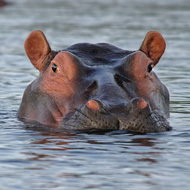Zambian hippo cull suspended

Born Free last week urged Zambian authorities to abandon the exercise.
A five-year hippo cull in Zambia's Luangwa Valley has been suspended, the Department of National Parks and Wildlife (DNPW) has revealed.
It was revealed last week that the culling exercise, which began in May, would aim to remove 2,000 hippos over five years.
Initially, the cull was reported to be a 'wildlife management tool' to prevent the spread of anthrax among wild animals. But in a statement on Tuesday (14 June), the DNPW said: 'Recently research revealed that the water levels in the Luangwa River system have been low and insufficient to support the hippo population especially in the dry season.
'DNPW has assessed the situation and estimated that 2,000 hippos need to be culled in a space of five years.'
Born Free last week urged Zambian authorities to abandon the exercise, questioning whether there is evidence to suggest hippos are overpopulated and whether culling is an effective control strategy for anthrax.
The DNPW said its suspension of the cull has been 'necessitated by events that have come with the culling activity that started in May'. It is now evaluating the situation and carrying out extensive consultations to find a way forward.



 The BSAVA has opened submissions for the BSAVA Clinical Research Abstracts 2026.
The BSAVA has opened submissions for the BSAVA Clinical Research Abstracts 2026.